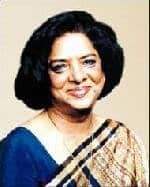Executive Director of the United Nations Population Fund

Dr. Nafis Sadik is the Pride of Pakistan. A graduate from Dow Medical College she did her internship in gynecology and obstetrics from America and after earning Fellowship from Canada she returned to Pakistan where she served as a civilian doctor in military hospitals. While working here she witnessed the plight of women and the burden of pregnancies on them. She then resolved to alleviate it by educating women in particular and masses in general about family planning. She has rendered her services in many parts of the world where death rates during child birth where high. In recognition to her services she has been conferred with many awards. She is also the first woman ever to hold the office of Executive Director of the United Nations Population Fund (UNFPA) with the rank of Under-Secretary-General, from 1987 to 2000.
Career
Pakistan
Before joining the United Nations, Dr. Sadik was Director-General of the Pakistan Central Family Planning Council, the Government agency charged with carrying out the national family planning programme. She had joined the Council in 1966, as Director of Planning and Training. She was appointed Deputy Director-General in 1968 and Director-General in 1970. Prior to that, in 1964, Dr. Sadik was appointed head of the Health Section of the Government’s Planning Commission. From 1954 to 1963, Dr. Sadik served as civilian medical officer in various Pakistani armed forces hospitals.
United Nations
Dr. Sadik was first appointed as Special Envoy for HIV/AIDS in Asia by former Secretary-General Kofi Anna in 2002 and was renewed of the appointment by the current Secretary-General Ban Ki-moon in 2007. She served as Executive Director of the United Nations Population Fund (UNFPA) from 1987 until 2000. Dr. Sadik joined the UNFPA in October 1971 and became Chief of the Programme Division in 1973. From 1977 until 1987, she was Assistant Executive Director. She currently sits on the Advisor Board for the German Foundation for World Population.
Dr. Rehana Mohammed Ali Shah has the distinction of being the first ever Pakistani female orthopedic surgeon. She graduated from Dow Medical College and got her FRCS degree from Scotland. To date she has performed over 5000 surgeries.
Dr Adeeb Rizvi is a Pakistani doctor and a philanthropist who has worked untiringly to help the suffering humanity. He set up SIUT (Sindh Institute of Urology and Transplant) the largest charitable organ transplant institute. Funded by the public this institute provides free treatment to the people suffering from renal problems from every nook and corner of the country.
A graduate from Dow Medical College, Dr. Sohail Ansari is an active member of the National Health Services and Consultant Physician in the U.K. He is the President of Pakistan Essex Doctors Association and has done a lot to help the doctors from Pakistan.
For her efforts to raise awareness of these issues and developing or effecting policies, Nafis Sadik has received awards from governments and organizations in many countries including Pakistan, China, Indonesia, Egypt and the United States. When she accepted the post of Executive Director of the United Nations Population Fund (UNFPA) in 1987, she became one of the highest ranking women in the UN and the first women ever to serve as an executive head of one of the UN’s major voluntarily funded programs. Echoing the sentiments of many others, at the Hague International Forum in 1999, Hillary Rodham Clinton said of Nafis Sadik, “I believe that the world owes her a debt of gratitude for all she has done over the years to place women at the very center of development.”
Nafis Sadik received her Doctorate of Medicine from Dow Medical College in Karachi, Pakistan. She did her internship in gynecology and obstetrics at City Hospital in Baltimore, and completed further studies at John Hopkins University. After serving as a research fellow at Queens University in Ontario, Canada, Nafis returned to work in Pakistan. From 1954 to 1963, she worked as a civilian doctor in Pakistani military hospitals.
The suffering she witnessed working in Pakistani hospitals early in her career set the course of the rest of her professional life. Her work reveals her commitment to reducing this suffering and doing what she could to raise public awareness of it. Since the beginning of her career, Nafis made it a point to educate her patients about the choices they had available to reduce the number of unwanted pregnancies. She advised both the women and their husbands on family planning issues and contraceptive methods against the will of her superiors who, at the time, considered these highly controversial topics.
IPS International Achievement Award, Dec 2000
She has repeatedly spoken about the adverse effects of having children at a very young age when she is “physically, intellectually, and emotionally underdeveloped.” According to Nafis, early pregnancies most often occur in areas where women grow up “without proper nourishment or healthcare or the education that will allow them to take care of themselves.”
In 1964, Nafis was appointed to head the health section of the Pakistan governments’ Planning Commission. The following year Pakistan’s first population policy was developed, primarily authored by Nafis Sadik. Later she served as the Deputy Director General and then Director General of the Pakistan Central Planning Council. (Inter Press Service International Achievement Award, United Nations, New York, 11 December 2000, REMARKS BY AMBASSADOR PENNY A. WENSLEY)
Nafis Sadik was first invited to join the UNFPA in 1971. Since then she served there in different capacities until retiring from the post of Executive Director in 2000. One of her major achievements was the International Conference on Population and Development (ICPD), held in Cairo in 1994. Nafis served as the Secretary-General of the conference which was attended by representatives from more than 180 countries. Population and development, women’s health, and gender equality emerged as focus topics at the conference. ICPD resulted in a 20-year Programme of Action dealing with women’s health, global population control and development. The conference has been considered a landmark achievement.
In a speech at the World Bank on World Health Day 1998, Nafis Sadik said, “Pregnancy is a part of a woman’s life but a woman’s life should not be defined by it. In many societies, however, the fact is that bearing and raising children does define a woman. She does many things in her life, but she is only given recognition for one of them.” Stressing the importance of the variety of roles women play in society, Nafis Sadik said, “When women are properly valued for all the things they do, then and only then, will their role as mothers be respected and the resources found to protect their lives and health.”
In a different speech in at an event in New York to mark the 50th anniversary of Pakistan, Nafis Sadik relayed the impact of population growth on Pakistani economy:
“At independence, Pakistan was the 13th most populous country in the world, with 32.5 million people; in 1996 it was seventh, with a population of 140 million. Pakistan’s population growth rate is now one of the highest in Asia at 2.7 percent: at independence we added a million people every year or so; today we are adding a million every three months. No conceivable development plan can sustain such a rate of population growth. If we are to meet the challenges of the 21st century, Pakistan must put slowing population growth at the head of its list of priorities.”
Speaking of Nafis Sadik’s early experience of working in Pakistani hospitals, the Australian ambassador remarked, “Many of the women she treated [there] simply accepted that the hard work, poor health, frequent pregnancies and a high risk of death in childbirth are women’s fate. They did not know or believe they had a choice.”
Nafis Sadik has written extensively on women’s health, family planning, and population and development. She has received honorary doctorate degrees from multiple universities in the US, including Brown, Duke, John Hopkins, as well as universities from Canada, Japan, and Jamaica.
Dr. Nafis Sadik Pictures
|
|
|











